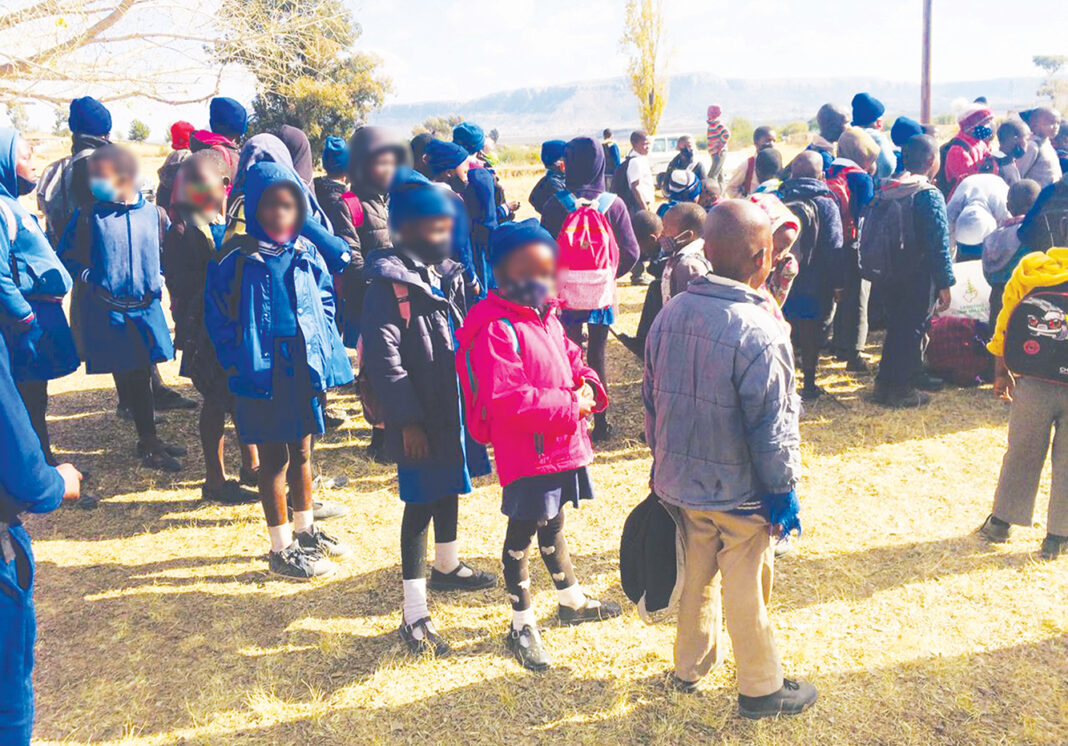By Neo Kolane
The 254 students attending Ha-Ramokotjo Primary School at Korokoro are forced to learn under harsh conditions as there is a shortage of food at the school.
Most of the learners leave home to attend classes on empty stomachs as their parents are unemployed and can hardly fend for their children.
According to the State of the World’s Children Report (SOWC), UNICEF 2015, children living in poverty experience deprivation of the material, spiritual, and emotional resources needed to survive, develop and thrive, leaving them unable to enjoy their rights, achieve their full potential or participate as full and equal members of society’.
The Global Study on Child Poverty and Disparities was launched by UNICEF in 2007 says that child wellbeing is material as well as spiritual and emotional. It is not enough to have access to education, health care, income and food but there needs to be a meaning to life, the ability to hold expectations, feel love, trust and a lack of abuse.
The study added that although this describes what poverty is with respect to children, it is difficult to conceptualise and measure in many situations. Yet it is important to include in any child poverty measurement the viewpoint of the child – how they experience poverty – while acknowledging the wider context that surrounds the child.
The principal of the school, ‘Maseitebatso Mofoka, says a bulk of learners depend on the food from the school feeding programme ‘but only receive one spoon of each kind of food.’
Mofoka was very delighted at the presence of Rotary Club of Maluti which donated basic food commodities to the learners on June 25, 2021.
She added that Rotary of Maluti has come up with an agricultural project whereby the pupils will grow crops such as vegetables that will be taken to their homes for consumption.
She said that there are three children from one of the households from the neighbouring village of Ha Katu, the Lekitlane family, who were abandoned by their mother who has just recently returned home from South Africa’s city of Johannesburg.
Mofoka narrated that some pupils fail to attend classes regularly “because they walk to school barefooted and hungry.”
She said she warned the mother that she was breaking the law by abandoning and neglecting her young children, and that she could face the might of the law.
Mofoka lamented that there is a shortage of teaching staff resulting in them being overloaded. The school has only five teachers including the principal.
‘Matiisetso Ramokotjo who feeds the children said that she feeds according to the old feeding scheme; whereby they are fed maize meal porridge (papa) with peas on Mondays. On Tuesdays they are served samp with beans while maize meal porridge and vegetables are dished out on Wednesdays. On Thursdays the pupils eat maize meal porridge and peas while on Fridays they are offered maize meal with some eggs.
“We don’t feed the children to get full despite their age. The same meal is served to all the learners who are in primary schools countrywide.
“Some leave their homes on an empty stomach. Each pupil is given one spoon of maize meal porridge just to beat the hunger,” she said.
Ramokotjo regretted that some children do not have eating utensils and are forced to use plastic bags as utensils.
Those who have their own utensils such as basins and lunchboxes are always advised to wash them as part of practicing good hygienic.
The food given to the children, she added, is supplied by the school feeding programme under the ministry of education and training.
She continued that the school was supplied with13 bags of maize meal, 25kg of peas, 100kg of samp and 50kg of beans.
“If the supplies get depleted ahead of the stipulated duration, I have to take fork out money from my own pocket to feed the children,” she explained.
Ramokotjo recounted how three siblings aged between eight and 11 were at one stage left alone as their mother had run off to South Africa to seek employment.
One of the indigent learners does not wear the uniform as it does not fit him.
The school had decided that the three children be given more food since no one was supporting them or providing for their basic needs.
One of the teachers Puleng Phafoli who has been working at the facility from 2017 has lamented the poor condition of most of the learners.
She said that the school is running short of human resources, forcing them to extra work hard. Sometimes she has to provide some of the children with body ointment.
Phafoli said the ministry of water has toured the place to assess the shortage of water resulting in minister Kemiso Mosenene visiting the place and donating food stuffs to the pupils.
She wondered how the children were coping as they only have limited food supply.
She has supplied some learners with some clothing that was bought for her own children.
In an interview with theReporter, Chief Executive Officer (CEO) of primary school Thuto Ntšekhe-Mokhehle revealed that the ministry of education was “meeting the ministry of social development half way by feeding the learners.”
“We feed the children because we realized that they have nothing to eat. They cannot concentrate in class since they leave their homes famished. Some just go school in order to eat. The ministry of education plays an important role in feeding the children,” Ntšekhe-Mokhele said.









